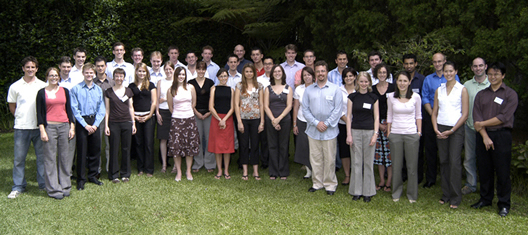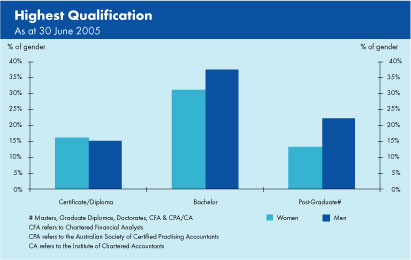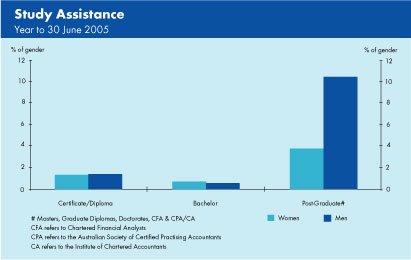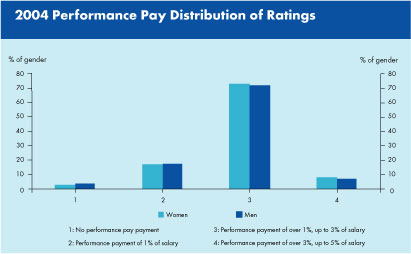Equity & Diversity Annual Report – 2005 Section 2: Human Resource Policies and Practices
This section reports on policies and practices in relation to recruitment and selection, training and development, and employment policies from a diversity perspective.
Section 2.1: Recruitment & Selection
General Recruitment
The RBA continues to be regarded as an attractive place of employment for high calibre staff, most of whom join through the annual graduate, cadetship and traineeship recruitment drives. Several initiatives have helped to introduce the RBA's employment opportunities to high school and university students. There has been a continuing emphasis on attracting more female candidates. Online remains the preferred method for applicants to receive information and to apply for positions.
Work Placement Program
The RBA supported the Orientation to the Workplace Program during the year. The program provides an opportunity for professional migrant workers to undertake six weeks' work experience, allowing participants the chance to learn about local work culture and practices. This year under the program, one IT professional worked at the RBA.
Graduates and Cadets
Both the graduate and cadetship recruitment campaigns continued to provide high quality applicants to departments. Advertising of opportunities continued in the national press, graduate publications and web-based job boards and graduate career information sites, including those provided by university careers services. Graduate information packs were sent to honours students at universities Australia-wide.
The RBA continued its participation in The Australasian Graduate Recruitment Benchmarking Study. This provides information on graduate recruitment practices in over 100 organisations in Australia and New Zealand and assists in maintaining a best practice approach to graduate recruitment.
Graduate Development Program
Graduates who join the RBA's two year Graduate Development Program (GDP) have honours or higher level studies in economics, finance or closely related studies. Graduates are recruited through the annual graduate recruitment program commencing in March, and from students completing the RBA Cadetship Award. The RBA also recruits small numbers of information technology and accounting graduates.

Forty graduates began the Graduate Development Program in 2005. This represented around a third of all new employees in 2004/05. The intake included 15 students from the 2003/04 Cadetship Award which continues to play a significant role in attracting high calibre graduates to the RBA. Of the forty graduates recruited, 15 (38%) are women; an increase from 28% in 2004 and 24% in 2003.
Cadetship Award
Pre-employment programs are becoming an increasingly important part of recruitment efforts at the graduate level. The RBA's Cadetship Award provides two-months of work experience to students who have completed, to a high standard, a minimum of three undergraduate years of study. Financial support is provided during the honours year for cadets who are offered and accept a place on a future Graduate Development Program.
The 2004/05 cadetship had 21 participants, 43 per cent of whom are women. This compares with 50 per cent in 2003/04 and 41 per cent in 2002/03. Ten of the 15 cadets who accepted offers to join the 2006 Graduate Development Program are women.
AXISS Scholarship Program
Participation in the AXISS Scholar Program continued in 2004/05. The Program is a government initiative administered by AXISS Australia (A division of Invest Australia), which facilitates partnerships between industry and universities to promote excellence in finance education. The Program provides an opportunity for talented finance or commerce students to undertake ten to fourteen weeks' paid work experience in the financial services industry. The scholarship is another effective way to source high calibre graduates and cadets for the Bank's Financial Markets Group. In 2004 the RBA employed one former AXISS scholar.

Information Technology Graduates
During 2004/05, Systems and Technology Department continued to be involved in placing students undertaking IT studies through an Industrial Training Program. Each student completes a twelve-month paid work placement as part of their degree. The RBA continues to successfully place students from this program into cadet and graduate positions. Two of the 40 graduates recruited to the 2005 Graduate Development Program were for the Systems and Technology Department, both male.
Traineeships
For the past 19 years, the RBA has supported the Australian Government's New Apprenticeship and Traineeship System. Twelve-month traineeships are offered in Business Administration, Print Design, and Information Technology.
Business Administration Traineeship
Business Administration trainees undertake off-the-job training one day per week towards a Certificate III in Business Administration. The training is conducted on the RBA's premises. Trainees rotate through three departments, spending approximately four months in each department. Each year, at least one Business Administration Traineeship placement is targeted at people with a disability and one for Indigenous Australians.
In March 2005, each of the seven 2004 Business Administration trainees successfully completed their traineeship. The group consisted of four males and three females and included two people with a disability and one Indigenous Australian. Five of the trainees gained full-time permanent employment with the RBA. A further ten trainees (five female, five male) were recruited in March for the 2005 program.
Print Design Traineeship
Each year the RBA offers one Print Design Traineeship. The trainee undertakes training one day per week towards a Certificate II in Printing and Graphic Arts (Print Design). The training is undertaken off-the-job at Ultimo TAFE. In December 2004, the Print Design Traineeship was successfully completed by a male. The traineeship was again offered in January 2005 and a female is currently undertaking the program.
Information Technology Traineeship
Information Technology trainees undertake training off-the-job one day per week. Two trainees successfully completed the program in 2005. A further three traineeships were offered in 2005 (one female, two male). The trainees are currently studying towards a Certificate IV in Information Technology (Network Management).
Section 2.2: Staff Training & Development
Staff Appraisal
A new appraisal form was implemented in 2004/05. It features a development plan to encourage greater focus on training and development. The plan records training goals, steps required for achievement, target dates and supervisor's comments upon completion. As before, there are mid and end term performance feedback discussions with staff on the achievement of job objectives. All position descriptions and organisation charts were reviewed during the year to ensure that responsibilities and accountabilities are accurately described.
General Training
During 2004/05, 629 staff (74 per cent) of staff attended some formal in-house training (75 per cent of women, 73 per cent of men). These figures exclude e-learning which is available to all staff throughout the year. In addition 24 per cent of staff attended external training and 6 per cent attended overseas courses and conferences. Twenty-nine presentations were made by staff on behalf of the RBA at conferences; seven of these were presented by women.
A number of new programs were trialled during 2004/05 including Project Management, Communication Essentials and two mental health workshops targeted at different levels: Beyond Blue Depression in the Workplace; and Psychological Problems in the Workplace Setting.
Following significant amendments to the OH&S Act, the RBA provided additional Occupational Health & Safety training for all RBA staff. All managers and supervisors were scheduled to attend a two or three hour workshop, delivered by a Comcare accredited trainer, covering essential information relating to the OH&S Act, office safety, rights and responsibilities, workplace injuries and the importance of OH&S training and awareness. In total 257 staff attended this workshop. The remainder of staff completed the RBA online module on Occupational Health and Safety.
Externally, Springboard continues to be offered, with 11 women attending the program during 2004/05. Other women's career management programs offered through the year include Xplore Career Resiliency and Xplore Your Corporate Voice which are aimed at different career levels. One female staff member is currently participating in the Women in Finance mentoring program.
Graduate Development Program
The Graduate Development Program provides extensive training and development opportunities as well as a strong foundation for longer-term professional development. The two-year formal training schedule aims to develop graduates' skills in the areas of computer applications, business writing, interpersonal skills, technical skills, professional presentations, time management, leadership and career management.
In 2005 the program was reviewed and modified and includes a new session on communication skills and a business writing refresher workshop. Graduate orientation week was also modified with self-development workshops and a stronger emphasis on building a social support network between graduates.

Management Programs
A further 28 staff (21 male, 7 female) attended the New Managers Program. In total, 145 staff have completed this course since it was introduced in 2001. The next RBA Central Banking Management Program, run every two years, is scheduled towards the end of 2005 with 16 participants (10 male, 6 female). An Executive Development Program is also being explored.

e-Learning
The RBA has an extensive e-Learning program. Staff have access to over 180 course titles relating to computer applications, IT technical software and hardware, and various business skills. Staff can access courses from their desktop, in the Self Paced Learning Centre or from their home computer. The RBA is introducing specialised financial courses for graduates and other staff in the policy areas from July 2005.
The RBA continues to provide a range of customised e-learning modules as part of the Orientation Program, including a module on equity and diversity. An additional module on Privacy was introduced this year. All new starters are required to complete the interactive modules within two weeks of commencement. Two further modules will be introduced in the next reporting period.
Educational Qualifications
Sixty-nine per cent of staff are recorded as having a post-secondary or tertiary qualification, the same as in 2004. Of those staff who have a post-secondary or tertiary qualification, 27 per cent hold a post graduate qualification; an increase of 1 per cent from 2004. Overall, 53 per cent of staff now hold a Bachelor Degree or higher.
There remains a substantial gender gap with 61 per cent of women holding a post-secondary qualification compared to 75 per cent of men. Forty-five per cent of women now hold a Bachelor Degree or higher (up from 43 per cent in 2004 and 40 per cent in 2003) compared to 60 per cent of men. The percentage of staff with post-secondary and post-graduate qualifications has risen in previous years as a result of the declining number of clerical relative to professional positions.

Study Assistance
Employees are encouraged to obtain qualifications of value to the RBA and relevant to their career. To assist staff in obtaining these qualifications, the RBA has a study assistance scheme where tuition fees are met by the RBA on successful completion of course subjects.
In 2004/05, 83 staff received study assistance (10 per cent of staff). Of those 83 staff, 23 per cent were female (down from 30 per cent in 2004). Overall 5 per cent of RBA women received assistance, down 1 per cent from 2004. The percentage of men who received assistance was 13 per cent, an increase of 3 per cent from 2004. The majority of staff who received study assistance were studying at the post-graduate level (82 per cent). Where the cost of a course exceeds a certain level, or for staff wishing to study full-time, staff must apply to the Bank Study Assistance Committee. In 2004 the Committee approved 10 (8 male, 2 female) part-time study assistance applications.

2004 Bank Study Assistance Committee




Post-Graduate Study Award
An important element of the RBA Study Assistance Scheme is the Post-Graduate Study Award (PGSA). This is offered each year to assist high calibre staff undertake full-time post-graduate study in relevant disciplines at universities in Australia or overseas. The PGSA represents a substantial investment by the RBA in upgrading the knowledge and skills of staff.
Since 1981, when the PGSA was formally introduced, 77 staff have participated in the program. During the year 10 staff (2 female, 8 male) were studying via the PGSA program; 8 of these were studying overseas.
In 2004, the Bank Study Assistance Committee approved four PGSA applications (all male). All of the award recipients nominated overseas institutions and will commence their studies in 2005/06.
2004 PGSA Recipients




Certificate IV in Business Administration
The RBA continued to assist clerical staff in obtaining Certificate IV in Business Administration qualifications. For Head Office staff, the training was changed from one-day a month to a half-day per fortnight, but remains over 12 months and continues to be conducted on the RBA's premises. Six staff (four female, two male) were studying towards the qualification during the reporting period. A further five staff (three female, two male) commenced the study program in 2005.
Section 2.3: Employment Policies
The RBA's Workplace Diversity Plan has the dual function of being a planning document and an audit tool to ensure that personnel practices and policies are fair, equitable, and ultimately assist in the attraction and retention of valued staff. The year in review has been a year of consolidating past initiatives and preparing for new initiatives to be introduced in 2005/06 under enterprise bargaining arrangements.
Personal Leave
To provide greater flexibility for staff, the RBA replaced the previous Sick and Carer's leave arrangements with a cumulative entitlement of 18 working days' Personal Leave for each 12-months of full-time paid continuous service, pro rated for part-time staff. Up to 10 days of Personal Leave may now be utilised each calendar year in the event of illness and/or incapacity of family or household members. Under the previous arrangements, full-time staff accrued 15 days sick leave per annum and were entitled to an additional five days non-cumulative carer's leave. The new arrangements were introduced from the start of 2005.
Leave Without Pay
During the year the RBA reviewed the policy of maintaining certain subsidised benefits for staff taking extended leave without pay. The impetus for the review was the increasing number of applications for leave without pay, the cost to the RBA of subsidised benefits, and practice elsewhere. As an outcome, from March 2005 the subsidy on those benefits has been removed for most employees taking more than four weeks leave without pay. This policy will not apply in relation to employees on parental leave absences of up to twelve months, leave without pay taken for reason of personal illness or RBA-supported secondments.
Enterprise Bargaining
The RBA is currently holding discussions with the Finance Sector Union, the main workplace union, on a new enterprise bargaining agreement. New proposals aimed at providing greater flexibility for employees taking parental leave include:
- An option for paid maternity leave to be taken at half pay;
- Paid paternity leave to be extended from one week to two weeks; and
- The guaranteed period of part-time work available after parental leave to be extended from six to twelve months.
It is also proposed that the working from home arrangements, which have been trialled since 2003, be confirmed as an on going policy.
Performance Pay: EBA covered staff

From the 2004/05 appraisal year there were changed performance appraisal and performance pay arrangements for EBA-covered staff. A new ranking scale provides for a percentage increase paid on actual salaries providing scope for more flexible rewards with the same budget constraints as in the past. Average performance pay outcomes were very similar for males, females, people from a non-Engish speaking background, and people with disabilities.
Consultation
The principal means of providing information to staff relating to equity and diversity are via the staff newsletter Staff Matters, the monthly staff magazine Currency and Personnel Department's intranet site. The Equity & Diversity Report 2004 was sent to staff via email, placed on the RBA's website, and hard copies made available upon request. Consultation with the Finance Sector Union took place during the year on a range of employment issues, including matters relating to a new enterprise bargaining agreement and establishment by the RBA of a business resumption site.